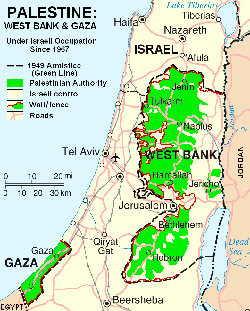An Israeli letter handed to the Palestinians was not enough to revive peace talks, because it gave no "clear answers" to Palestinian conditions for such talks, officials said Sunday, DPA reported.
Those conditions were first and foremost a cessation of Israeli settlement activity in the West Bank and East Jerusalem, they reiterated.
Israeli Prime Minister Benjamin Netanyahu's envoy, Yitzhak Molcho, handed the letter to Palestinian President Mahmoud Abbas during a meeting late Saturday in Ramallah.
Abbas briefed the Palestine Liberation Organization (PLO) on Sunday, whose executive committee dismissed the letter in a statement as including no "clear answers about the central issues that block the resumption of the peace process."
These issues were Israel's ongoing settlement expansion as well as its failure to recognize the border lines from before the 1967 war - when it captured the West Bank from Jordan and the Gaza Strip from Egypt - as the basis for talks.
The PLO body also called for the release of Palestinian prisoners.
Meanwhile, Netanyahu's spokesman Mark Regev reiterated the Israeli position that talks should be revived "without any preconditions."
The Abbas-Molcho meeting was the first since the centrist Kadima faction joined the premier's right-wing coalition last week, forming a government of national unity with an avowed key goal of reviving the peace talks.
Despite the ongoing stalemate, the two sides earlier issued a rare joint statement after the parley.
"Israel and the Palestinian Authority are committed to achieving peace, and the sides hope that the exchange of letters between President Abbas and Prime Minister Netanyahu will further this goal," the statement said.
Netanyahu also addressed his unity cabinet's first session in Jerusalem.
"I hope that we will be able to advance the dialogue between the sides in order to resume the diplomatic talks," the premier said.
Abbas said his meeting with Molcho had focused mostly on the mass hunger strike by Palestinian prisoners in Israeli jails.
"We are working to end this crisis as soon as possible," he told the PLO executives.
More than 4,000 Palestinians are jailed in Israel for security-related offences, but the Palestinians consider them to be political prisoners. Most are militants, but they also include Hamas lawmakers.
The hunger striking prisoners' demands include visiting rights for their Gazan relatives, disallowed since the radical Islamist movement seized sole control of the coastal enclave in 2007.
They also want an end to Israel's controversial use of so-called 'administrative detention', which allows it to jail suspected militants deemed a security risk for extendable periods of six months, without charge and based on secret intelligence shown only to a military judge.
Regev did not comment on speculation of behind-the-scenes negotiations between Israelis and Palestinians in a bid to end the hunger strike, possibly this week.
The mass hunger strike will enter its fifth week on Tuesday, while two are said to have been without food for over 75 days - although the Israeli prison service says they are on intravenous drips.
Abbas said it would be "a national disaster" if any of the hunger strikers was hurt.
The PLO called on all Palestinians to fast Monday in solidarity with the prisoners.
The Israeli government bore "full responsibility" for their lives, its statement said, calling on Israel to meet the hunger strikers' "just and legitimate" demands.
Meanwhile Sunday, dozens of Palestinian protesters blocked the entrances to United Nations offices and the International Committee of the Red Cross (ICRC) in Gaza City.
"Shut down until the demands of the prisoners are met!" they spray-painted on the walls.
Israeli-Palestinian peace talks stalled in September 2010, when Israel failed to extend a 10-month partial moratorium on construction in its West Bank settlements, arguing that the Palestinians had left it to the last minute before agreeing to negotiate.
Since then, Israel has insisted on negotiations without preconditions, while Abbas has demanded a new settlement freeze.
Abbas fears that it would jeopardize a viable Palestinian state if settlements continued to expand while open-ended negotiations were underway. He has warned that the Palestinians will resume their efforts for UN recognition if negotiations are not renewed.






